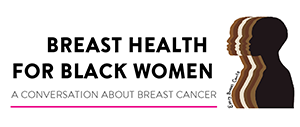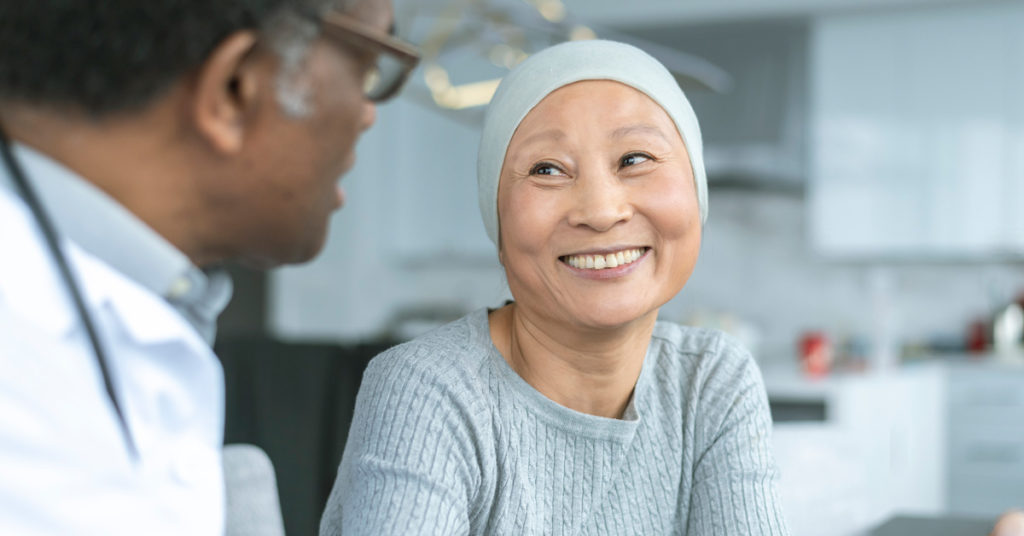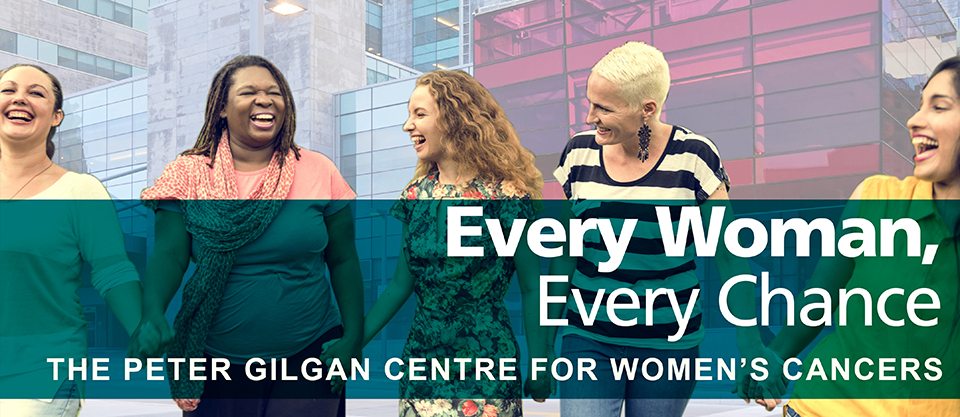
Contact Info
Phone: 416-323-6400 ext. 5987
For more cancer-related information, please visit: Canadian Cancer Society
To connect with others about their cancer experience, please visit: CancerConnection.ca
Who We Are
The Peter Gilgan Centre for Women’s Cancers is a virtual program located at Women’s College Hospital (WCH), which supports patient-centred cancer care in partnership with WCH’s Surgical and Gynecology Services, Medical Imaging, Specialized Medicine Services, the Genetics and Hereditary Breast Cancer Clinic and the After Cancer Treatment Transition (ACTT) Clinic.
The Centre draws together excellence in research, clinical care, innovation and education for women’s cancers. Our team is driven by a powerful vision to give every woman every chance to access the highest standard of cancer care no matter where she lives in Canada.
We are working to make changes in the lives of people touched by women’s cancers by offering patient-centred care at all stages, providing training for health care professionals, empowering individuals with the information they need throughout their cancer journey and revolutionizing care through groundbreaking research.
What We Do
Our clinics at WCH, in partnership with The Centre, offer access to screening and prevention, resources, tools, services and educational materials to empower patients with the information they need. These clinics provide access to diagnosis for breast, endometrial, cervical and thyroid cancers, they perform preventative surgeries for breast and ovarian cancer and offer long-term aftercare, surveillance and support for cancer patients.
In collaboration with these clinics, we are committed to supporting patients through their cancer care journey. Our priorities are to help individuals reduce their risk of getting cancer, diagnose symptoms that are suggestive of cancer, provide access to screening so we can detect cancer early and offer wrap-around support after a diagnosis.
Are you a healthcare practitioner seeking knowledge and tools around breast health and breast cancer management? Join The Medical Breast Training Program run by The Mayo Clinic, in collaboration with The Cleveland Clinic and our Peter Gilgan Centre.
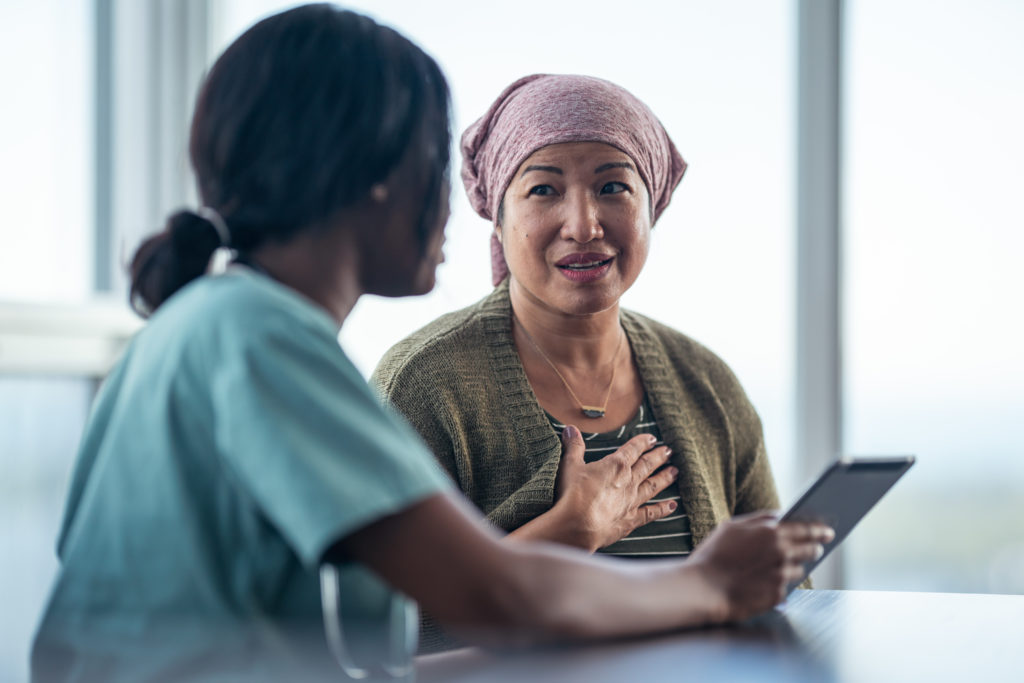
Programs at WCH
Clinics at WCH
Research, Innovation, and Partnerships
- Impact of germline mutations in cancer-predisposing genes on long-term survival in patients with epithelial ovarian cancer
- Impact of rapid genetic testing for BRCA1 and BRCA2 at time of breast cancer diagnosis on psychosocial functioning
- Afrocentric screening program for breast, colorectal and cervical cancer among immigrant patients in Ontario
- A closer look at chemotherapy-induced heart failure in the setting of early breast cancer
- Weight gain and the risk of ovarian cancer in BRCA1 and BRCA2 mutation carriers
A Study of Familial Breast Cancer in BRCA Mutation-Negative Families: Women with a strong family history of breast cancer, but no BRCA1 or BRCA2 mutation, are two to four times more likely to develop breast cancer than women without a family history. Despite this elevated risk, no clinical guidelines have been developed for the care of these women. This study evaluates factors which may influence their risk.
Breast Cancer Treatment in Women with PALB2 Mutations: The Familial Breast Cancer Research Unit at Women’s College Hospital is conducting a research study to better understand breast cancer treatment among women with a PALB2 gene mutation.
Cognition in BRCA1 and BRCA2 Mutation Carriers: We are currently recruiting individuals to participate in a study investigating the effects of prophylactic oophorectomy (surgical removal of an ovary or ovaries) on cognition over a three-year period. The purpose of this study is to evaluate possible changes in memory and attention and to determine if there is any correlation with another gene, apolipoprotein E (APOE).
Follow-up Telephone Genetic Counselling Study: This research study aims to evaluate a follow-up telephone-based genetic counselling intervention for women with a BRCA1 or BRCA2 mutation who have received genetic counselling in the past.
Rapid Genetic Testing for Newly Diagnosed Breast Cancer Patients Phase II: This study provides genetic testing for nine genes associated with increased risk of breast and other cancers free of charge to participants. Test results are available quickly, with a testing turnaround time of 5-12 days, and all results are disclosed to participants by a genetic counsellor.
Reducing the bUrden of Breast cancer in Young women (RUBY) Study: This study is a pan-Canadian collaborative comprised of a national network of 62 researchers and clinicians at 44 institutions and clinics across Canada, with the common goal of studying breast cancer in young women.
Risk Factor Analysis of Hereditary Breast and Ovarian Cancer: This is the largest long-term study of women who carry a mutation in one of the two breast cancer genes (BRCA1/BRCA2). Its purpose is to better understand the prevention and treatment of hereditary breast and ovarian cancers.
The Screen Project: The Screen Project is a Canadian National initiative to make BRCA1 & BRCA2 screening available to all Canadians over 18 years of age at an accessible price. We hope that our study will reduce the mortality from breast, ovarian, prostate and other cancers.
- Barrie and Community Family Health Team
- The BETTER Program
- Canadian Cancer Society
- Canadian Cancer Society – Cancer Connection
- Cancer Care Ontario Indigenous Navigators
- ReThink Breast Cancer
- Women’s College Academic Family Health Team
- Women’s College Research Institute
- The Women’s College Hospital Institute for Health System Solutions and Virtual Care
Breast Reconstruction Awareness (BRA) Day

Previous BRA Day videos:
BRA day 2021 Playlist
BRA Day 2020 Playlist
Videos
- A guide to BRCA1 and BRCA2 gene mutations in hereditary breast and ovarian cancer
- A guide to talking about BRCA mutations
- Recovering from surgery: What you need to know after having your ovaries and fallopian tubes removed
- Strategies to support a loved one with a breast cancer diagnosis – Facebook Live
- Hereditary Cancer Webinar Series
Events
Virtual Hereditary Cancer Series
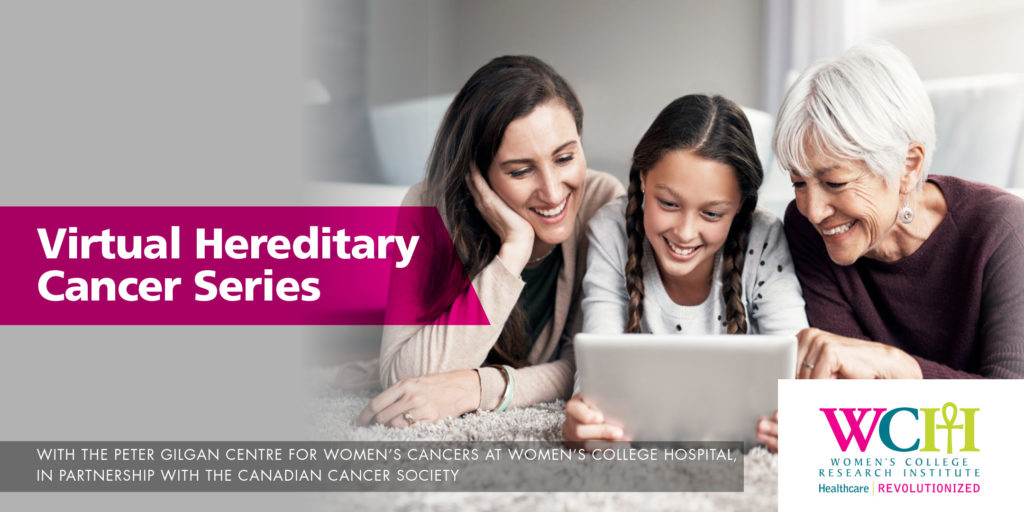
Breast Reconstruction & Genetics Seminar Series
Whether you are interested in learning more about breast reconstruction in general, or how genetics can play a role in women’s cancers, these sessions can help you find answers to your questions. The Peter Gilgan Centre for Women’s Cancers has created a number of education sessions for patients at the hospital this year.
Sessions are free! To register, please e-mail Luana Pereira at luana.pereira@wchospital.ca
Contemplating breast reconstruction can sometimes be overwhelming. Women’s College Hospital runs informal workshops for those who are considering reconstruction, either after a breast cancer diagnosis or as a preventative measure. The session opens up an opportunity to educate yourself about breast reconstruction surgery, share questions and concerns, and meet others who have had similar experiences. Sessions are led by the breast centre health care team and cover a variety of topics, including: reconstruction options, post-surgical care, stress management, diet, exercise and body image.
When: Monday, June 26, 2023
Where: Virtual Zoom
Registration: Please e-mail emma.rinaldo@wchospital.ca
A guide to BRCA 1&2 gene mutations in hereditary breast and ovarian cancer
Have you or a family member been identified as a carrier for the BRCA1 or BRCA2 gene mutation? Women’s College Hospital is offering a workshop led by the clinical genetics team, giving you the opportunity to:
- Understand what it means to carry a BRCA1 or BRCA2 gene mutation and the associated cancer risks.
- Discuss the most up-to-date guidelines and options for managing cancer risks.
- Support and discuss the importance of sharing genetic testing information with your family.
- Address frequently asked questions.
Dates:
- No events scheduled at this time.
Resources for this session:
A guide to talking about BRCA mutations
If you’re looking for help with how to talk to your children or your family members about a BRCA gene mutation, this session gives you the opportunity to:
- Learn the dynamics of talking about hereditary gene mutations with your family, including how to assess parent and child readiness and how to start conversations (considering things like timing and the environment).
- Get support from professionals and peers who have been there to receive guidance.
- Interact with tools that can help with decision making and understanding your own comfort levels with BRCA.
Dates:
- No events scheduled at this time.
Resources for this session:
Cancer Care & COVID-19
Your health is important, even during a pandemic. If you notice a change or a new symptom that could indicate cancer, please contact your primary care provider immediately and don’t wait for the end of COVID-19. At Women’s College Hospital, safety is our top priority and we’re open for in-person appointments. If you don’t feel comfortable coming in, we are also offering telephone and virtual visits.
For information about our breast cancer services during COVID-19 and tips for coping with a cancer diagnosis, please download this resource (.pdf).
Breast Health
- New lump in your breast or under your armpit
- Persistent change in the shape or size of your breast
- Nipple suddenly points inward and stays that way
- Bloody discharge from a nipple
- Persistent breast fullness, skin irritation, nipple pain or redness
Ovarian Health
- Vaginal bleeding that is heavy or occurring between periods
- Vaginal bleeding especially after menopause
- A lump in your pelvis or abdomen
- The need to urinate often or an urgent need to do so
- Feeling full after a small meal or loss of appetite, heartburn, gas, indigestion or nausea
- A lot of pressure in your pelvis or abdomen
Lung Health
- A cough that gets worse or that doesn’t stop after four weeks
- Shortness of breath or wheezing
- Ongoing chest pain that gets worse with deep breathing or coughing
- Blood in mucous that is coughed up from your lungs
- Have chest infections like bronchitis or pneumonia that do not improve or keep coming back
At Women’s College Hospital (WCH), your safety and the safety of our physicians and staff is a priority. Minimizing the number of people that come into our hospital during the pandemic is critical to reduce infection transmission.
To keep you safe, we have several protocols in place. It’s essential that everyone who enters the hospital follow strict infection prevention and control practices, including but not limited to hand hygiene, respiratory etiquette, screening for signs and symptoms of illness, and the use of face masks as required.
Along with other infection prevention and control measures, healthcare organizations have placed limitations on the number of people allowed within the hospital environment during the pandemic. These limitations reduce exposure to potentially infectious individuals and promote the safety of patients, healthcare providers, staff and the public. Adhering closely to these measures, WCH is open. We encourage you to book an appointment should you need to speak with your healthcare provider to discuss any cancer-related concerns.
Health care needs, specifically cancer concerns, should not be put aside because of COVID-19 — they are more important now than ever. We encourage you to pay close attention to changes in your health, monitor any new symptoms and be proactive if something doesn’t look or feel right.
Our Breast Centre, Familial Ovarian Cancer Clinic (FOCC) and FOCC-Aftercare Clinics, and Gynecology Clinic are open for in-person, telephone or virtual appointments, along with our Family Practice Health Centre. If you are a patient at WCH experiencing any new symptoms, please make an appointment with your primary care provider to address your concerns.
If your family physician is not at WCH or is not offering services, The Ontario College of Family Physicians has put together this helpful resource to help you access the care you need. Options include finding a walk-in clinic in your neighborhood, connecting with a doctor at the Ontario Virtual Care Clinic and/or finding a family doctor if you don’t already have one.
WCH is open for in-person visits with an appointment to help with any cancer concerns that have been identified by you at home, on imaging or through family history. To learn what you can expect when visiting our hospital, please click here. Telephone and virtual visits are also available.
Yes, WCH is fully accessible and all clinics have wheelchair-accessible washrooms.
In accordance with the Accessibility for Ontarians with Disabilities Act (AODA), WCH is committed to providing inclusive and responsive goods and services in a manner that respects the dignity and independence of all persons with disabilities. To ensure that our services are accessible to everyone, we will enable access to assistive devices, including, but not limited to, wheelchairs, hearing devices and accessible beds. We also welcome those partnered with a service animal or support person.
At WCH, we are committed to promoting the principles of equity, diversity and inclusion to ensure no individual or group is overlooked during and after COVID-19. We treat all patients regardless of race, ethnicity, sex, gender, religion, income, age or education.
If you’ve been diagnosed with cancer and have started treatment, follow these tips to help reduce your exposure:
- Avoid touching your face, nose, eyes and mouth, as these are areas where the virus can enter your system.
- Prioritize hand hygiene and wash your hands with soap and water for 20 seconds. If you don’t have access to soap and water, please use an alcohol-based hand rub.
- Avoid contact with those who are sick or unwell, who have recently been exposed to COVID-19 or who have newly travelled to a high-risk area or country.
- Using a disinfectant wipe, clean items you touch often, including light switches, doorknobs and your mobile phone.
- Avoid crowds and any unnecessary physical contact, including hugging, kissing and hand shaking.
- If you need to go out in public, wear a mask and stay six feet apart from others.
Avoid non-essential outings, including unnecessary travel and in-person social gatherings. - Connect with your healthcare team to identify periods in your treatment where you’re at greater risk of infection so you can plan your activities accordingly.
For more on what you need to know about COVID-19 and cancer, please visit: cancercareontario.ca
- You may be experiencing a wide range of emotions. Take time to identify them and take a moment to tune into your body and notice how you are feeling. Often accepting the distress is the quickest way to feel calmer.
- Focus on what is within your control, such as exercising, eating well, seeking and offering support. It may be helpful to create a list.
- Practice tolerating the uncertainty. When we experience anxiety, it is usually related to a lack of control. Remind yourself that uncertainty is a part of life, but it will pass.
- Challenge any negative automatic thoughts. Distinguish fact from fear.
- Create a philosophy for how you are going to approach your cancer trajectory. For example, creating a mantra can help with frame of mind.
- Build structure into your everyday routine. Include a combination of tasks and pleasures as both can provide a sense of purpose and a feeling of mastery.
- Develop a Self-Care Plan. For example, document all of the activities that give you joy such as listening to music, journaling, taking a bath, etc.
- If you are feeling low and do not feel like doing anything, try the opposite approach. Don’t think – just do. Go outside for a walk.
- Start a daily gratitude practice that focuses on what went well in the day. What are you grateful for? At the same time, start a daily breathing practice to help you relax.
Get all of the information you can about your cancer. This might mean reaching out to your healthcare team and reading information from reputable and credible sites like the Canadian Cancer Society.
- For cancer and COVID-19 resources and webinars developed by the Canadian Cancer Society, please click here.
- For questions about cancer and COVID-19, speak with an Information Specialist at the Cancer Information Helpline by clicking here.
- To connect with others within the Canadian Cancer Society’s online community, please click here.
- For psychosocial support, please contact The Peter Gilgan Centre for Women’s Cancers social worker, Emma Rinaldo at emma.rinaldo@wchospital.ca or 416.323.7330
- For peer support, please contact The Peter Gilgan Centre for Women’s Cancers and Canadian Cancer Society’s peer support specialist, Kate Mlodzik at myccssupport@wchospital.ca

![Pink Cancer ribbon in calendar icon]](https://www.womenscollegehospital.ca/wp-content/uploads/2024/02/BRADAYBCAM-150x150.png)

